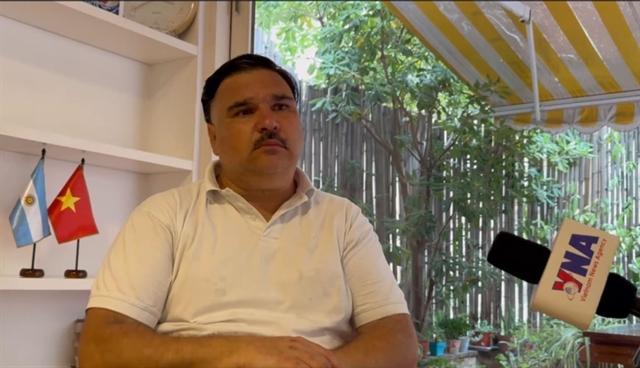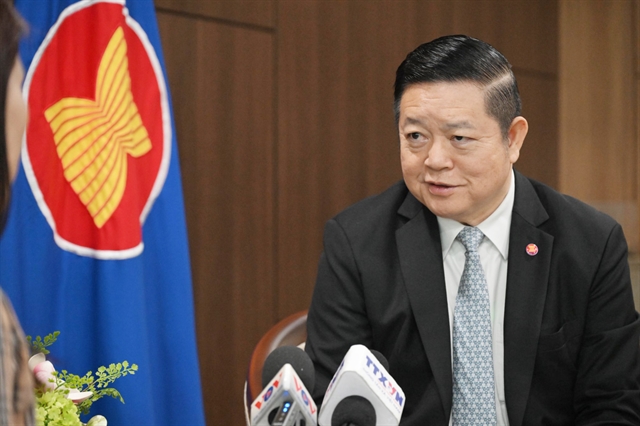 Opinion
Opinion

 |
| ASEAN Secretary-General Kao Kim Hourn. — Photo coutersy of the ASEAN Secretariat |
On the occasion of the 58th anniversary of ASEAN’s founding on August 8, 1967 and the 30th anniversary of Việt Nam’s official accession to the bloc on July 28, 1995, ASEAN Secretary-General Kao Kim Hourn spoke to Vietnam News Agency about ASEAN's development journey.
In the context of ASEAN facing numerous challenges, such as global geopolitical shifts, tariffs and member-state-related issues, how will ASEAN maintain unity as well as its central role?
ASEAN has undergone 58 years of establishment, growth and maturation. We are also heading toward a significant milestone: ASEAN’s 60th anniversary in 2027.
This journey has not been easy. We have faced many challenges internally, regionally and globally.
I believe that over time, despite differing circumstances, ASEAN has consistently demonstrated its adaptability and resilience. This means we have responded proactively, flexibly and effectively to adversity.
On this year’s ASEAN Day (August 8), I want to emphasise ASEAN’s core interests: maintaining, strengthening and promoting peace and security in the region, both among member states and within each country.
In addition, promoting shared prosperity remains a top priority.
ASEAN leaders and ministers are striving to mitigate the negative impacts of tariff and trade issues, which may have both short- and long-term effects.
ASEAN needs proactive strategies to navigate this challenging period while enhancing its capacity to address global issues like climate change and expand cooperation both within the bloc and with external partners.
The issues we face may originate from within member states or from the regional and global environment. However, what matters most is that ASEAN remains committed to the spirit of community, as reaffirmed in the ASEAN Community Vision 2025, marking a critical phase in building the ASEAN Community.
To date, ASEAN leaders have adopted the ASEAN Community Vision 2045. This is the first time ASEAN has developed a long-term strategic plan over a 20-year horizon, building on past achievements and valuable lessons.
We must not take peace and prosperity for granted. It is our responsibility to continue working hard to identify and overcome challenges that threaten ASEAN’s unity and cohesion.
Some challenges are visible, while others require time to fully understand.
But above all, we must always remain aware of ASEAN’s common interest: building a cohesive, resilient community with a central role in the region.
After 30 years of being a member of ASEAN, Việt Nam has made significant contributions while also benefitting from the association. Could you offer some recommendations for enhancing future cooperation between Việt Nam and ASEAN?
Việt Nam has been an active member over the past 30 years, as seen through its initiatives and proposals. Notably, Việt Nam will soon host the 25th anniversary celebration of the Initiative for ASEAN Integration.
Within ASEAN’s cooperation mechanisms, among member states and with dialogue partners through ASEAN+1, Việt Nam has frequently taken on the role of a coordinating country. This not only demonstrates the trust placed in Việt Nam, but also reflects its substantive contributions to ASEAN integration.
Việt Nam also actively participates in multilateral frameworks, such as the ASEAN Regional Forum, East Asia Summit and ASEAN Defence Ministers’ Meeting-Plus. These contributions have strengthened ASEAN’s institutional development and enhanced its adaptability.
Việt Nam has held the ASEAN chairmanship three times. In each term, Việt Nam made notable contributions, not only in coordinating political, security and economic cooperation, but also in attracting foreign investment into the region. While investment attraction levels may vary among countries, all ASEAN members benefit from these capital flows.
Việt Nam also actively promotes cooperation in tourism, agriculture and education, three of the main pillars of the ASEAN Community.
With a population of over 100 million — the third largest in ASEAN after Indonesia and the Philippines — and impressive economic growth, Việt Nam significantly contributes to the region’s GDP and plays an important role in ensuring peace, stability and sustainable development.
I believe that, with its achievements so far, Việt Nam will continue to accompany ASEAN and make even greater contributions to the association.
In the context of the fourth industrial revolution, especially with the rapid rise of artificial intelligence (AI), how do you assess the potential for technology cooperation between Việt Nam and other ASEAN countries, as well as Việt Nam’s role in regional digital transformation?
Digital transformation is currently one of ASEAN’s top strategic priorities. This process is already underway and will certainly be further promoted moving forward.
Within the regional framework, ASEAN is actively discussing and coordinating on key issues such as AI, access to new technologies and promoting negotiations for the ASEAN Digital Economy Framework Agreement.
This is a critical initiative that we hope to finalise by the end of the year and conclude an agreement in 2026.
I believe Việt Nam, with its large population and young workforce, will play a prominent role in this process. Given its inherent advantages, Việt Nam’s digital economy is growing rapidly and holds great potential.
Việt Nam is also investing heavily in digital infrastructure, education and workforce training to meet the demands of the digital transformation.
Notably, in this field, ASEAN is not only fostering intra-bloc collaboration, but also expanding partnerships with external countries and organisations that have strong technological and financial capabilities, such as the United States, China, Japan, South Korea and the European Union.
The key is that we must maintain an open mindset, proactively engage and actively coordinate with partners to fully tap into the potential of the digital transformation for the shared benefit of the entire region. VNS